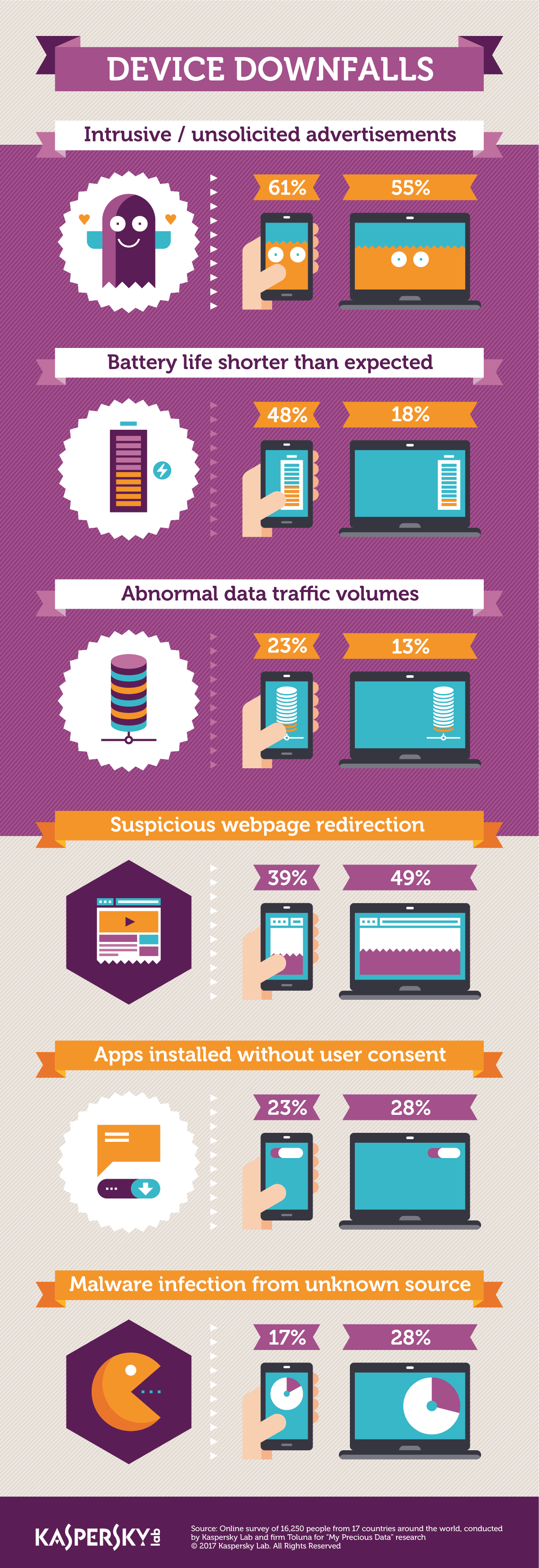Digital clutter is a phenomenon that plagues modern digital devices, with the increasing levels of information stored on smartphones, tablets and computers put at risk by users’ poor digital hygiene.
Digital clutter is a phenomenon that plagues modern digital devices, with the increasing levels of information stored on smartphones, tablets and computers put at risk by users’ poor digital hygiene. New research* by Kaspersky Lab reveals that user attitudes towards app care and maintenance on their devices is making sensitive data on computers and tablets particularly vulnerable to security threats.
The research shows us that keeping control of the content on their devices is a task that users tend to avoid. Only about half of people revise the content on their computers and tablets on a regular basis but as many as two-in-three (63%) people do this on their smartphones. However, this is typically because smartphones have less memory than computers and tablets. In fact, 35% of users have deleted apps on their smartphones due to lack of storage, whereas only 13% of users on computers have done the same.
A quarter of users don’t remember when they last uninstalled an application from their computers, while this figure goes down to 12% for smartphones. This has led to a situation where a third of applications on user computers are completely redundant – they are never used, but stay on the hard disk taking up space and potentially running in the background, putting sensitive information at risk.
All of our devices store sensitive data, and they should therefore be maintained in the same way. However, the research shows us that users do not treat their devices equally. The survey found that 65% of users update apps on their smartphones as soon as they are released, providing them with the latest security patches and updates. By contrast, users are less likely to update apps on tablets and computers, with just 42% and 48% respectively updating apps as soon as possible.
As a result of this behavior, users are risking a range of problems associated with a buildup of digital clutter on their devices – particularly on their computers. Kaspersky Lab statistics show us that users face malware on their computers more than other devices (28% compared to 17% on smartphones). Worryingly, the study has found a contradiction in user attitudes towards their devices and the threats they face on those devices. According to the survey, despite users’ risky attitudes to managing clutter on computers and the greater threat of malware infections on these devices, most respondents still consider computers to be the safest place for their data.
Andrei Mochola, Head of Consumer Business at Kaspersky Lab said: “The digital devices we use every day store precious data that users don’t want to fall into the wrong hands or lose due to a device crashing or malware infection. Combatting digital clutter requires users to take action managing, cleaning and updating apps across all devices in their household. Care and maintenance should be a priority in your digital life, as in the physical world, in order to keep the hackers at bay.”
In order to keep digital devices safe, users are advised to take the following steps:
- Update apps – it is important for users to update apps as soon as new versions are released because they might include security patches that prevent or reduce vulnerabilities in the app
- Clean apps – improperly managed smartphone apps also represent a security threat because they often transmit data even when they’re not being used.
- Change app settings – these enable the user to manage how the app interacts with the device. For example, apps can get access to user sensitive information, track user locations and share user data with third party servers. Failure to manage these settings can result in unused apps gaining access to information on the device without the user being aware.
- Use specialist software – install specialist software that can help to distinguish apps behaving suspiciously and those that are not used, as well as those which need to be updated. To find out more about these features in Kaspersky Lab’s flagship security solutions for home users, please follow the link.
*The study “Digital Clutter and its Dangers” was based on insight gained from a unique combination of online research and technical analysis of security threats and app performance:
- Statistics from the Kaspersky Security Network, a cloud-based system that processes depersonalized cyberthreat-related statistics received from millions of Windows and Android devices owned by Kaspersky Lab users across the globe.
- A real-life experiment on Android devices analyzed the performance of applications was conducted in January 2017 by Kaspersky Lab internal testers.
- An online survey conducted by research firm Toluna and Kaspersky Lab in January 2017 assessed the attitudes of 16,250 users aged over 16 years old from 17 countries. Data was weighted to be globally representative and consistent, split equally between men and women.
For more information, please read the full report, Digital Clutter and its Dangers.

